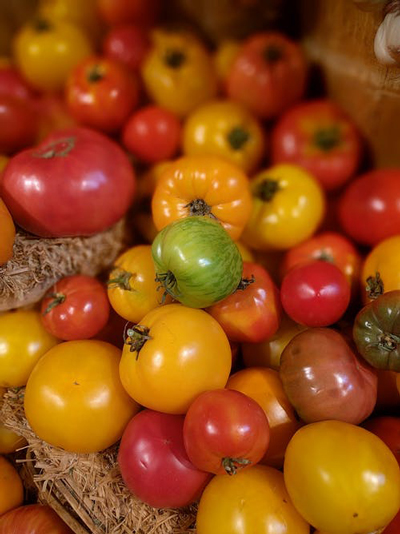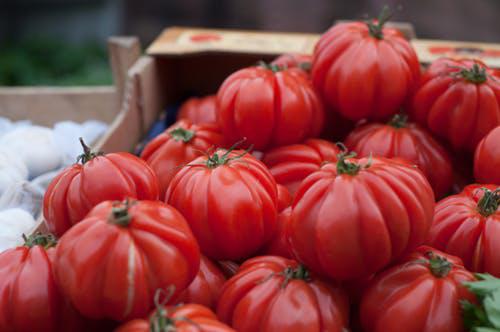 February 18, 2019 - By Bob Labozetta (UC Master Gardener, Mariposa) - This is the first of a three-part series about growing tomatoes in the Sierra foothills. Part 2 and 3 will follow in the coming months.
February 18, 2019 - By Bob Labozetta (UC Master Gardener, Mariposa) - This is the first of a three-part series about growing tomatoes in the Sierra foothills. Part 2 and 3 will follow in the coming months.
Although tomatoes need full sun and warm temperatures to thrive, there can be too much of a good thing. Tomatoes are adversely affected by temperature extremes. When temperatures stay over 90℉ during the day and the nights remain above 70℉, non-adapted tomato blooms often fail to pollinate, drop off, and/or fail to set fruit. Timing and varietal selection is the key to growing tomatoes in our hot climate.
Choose varieties adapted for hot, dry climates. Short-to-midseason varieties will flower, set fruit, and mature (hopefully) before the extremely hot weather hits. Look for maturity dates of 60-70 days, though in some areas of the county gardeners have success with 80-day maturity varieties.
Varieties can be open-pollinated, heirloom, or hybrids. Open-pollinated varieties are the result of pollination that occurs by animal, wind, or other natural means. Heirlooms are open-pollinated varieties that have been passed down through generations within a family or a community. Hybrids are the result of human-controlled pollination whereby the pollen of two different species or varieties is crossed to affect certain desired characteristics such as disease resistance, length to maturity, or success in specific climate conditions.
Seeds can be saved from open-pollinated plant fruits and will produce plants that will be true-to-type. Plants grown from seeds saved from open-pollinated parents will (over time) adapt to local growing conditions of climate and soil. Just make sure pollen is not crossed between different varieties within the same species. However, seeds produced from hybrid plants will NOT result in true-to-type offspring.
Though not specifically related to hot, dry conditions, specific diseases endemic to our area should be taken into consideration. Verticillium wilt (often coded as V on seed packets) and Fusarium wilt (coded as F on seed packets) are common soil-borne diseases that affect tomato plants. Hybrid plants noted for resistance to these diseases may be preferable.
Common heat and drought tolerant varieties (as evaluated by UC researchers suitable for areas having daytime temperatures regularly above 950F during the summer) include:
- Cherry Types (Cherry Grande Hybrid VF, Large Red Cherry, Sungold, Super Sweet 100 Hybrid VF, Sweet Chelsea Hybrid VFFNT, Yellow Pear),
- Container Types (Better Bush Hybrid VFN, Patio Hybrid VASt, Small Fry VFANSt, Toy Boy VF), and
- Standard Types (Ace Hybrid, Big Pick VFNT, Big Set VFN, Celebrity Hybrid VFFNTASt, Champion Hybrid VFNT, Early Bush 76 VF, Early Pick Hybrid VF, Floramerica Hybrid VFFASt, Jackpot Hybrid VFFANSt, Jet Star Hybrid VF, Royal Flush VFN, Shady Lady)
Other types mentioned by UC Master Gardener groups in climate zones similar to ours include:
- Cherry Types (Green Grape, Juliet Hybrid)
- Standard Types (Arkansas Traveler, Ball's Beefsteak Hybrid VFFT, Beefmaster Hybrid VFNASt, Big Beef VFFNTA, Bloody Butcher, Brandywine OTV, Cherokee Chocolate, Cherokee Purple, Early Girl Hybrid VFF, Gregori's Altai, Jetsetter VFFNTA, Matina, Park’s Whopper CR Improved Hybrid VFFNT, Pruden’s Purple, Virginia Sweets)
 Many gardeners plant determinate varieties (bush tomatoes bearing fruit over a 4-6-week period before high heat sets in) as opposed to indeterminate varieties, usually vine tomatoes, that produce blossoms and fruit over a longer period of time.
Many gardeners plant determinate varieties (bush tomatoes bearing fruit over a 4-6-week period before high heat sets in) as opposed to indeterminate varieties, usually vine tomatoes, that produce blossoms and fruit over a longer period of time.
Some of the above tomato varieties will be available as seedlings at the UC Master Gardener Spring Plant and Garden Art sale Saturday, April 27 at the Mariposa County Fairgrounds.
Start planting seeds indoors in late February to early March. However, your microclimate can influence these dates, so make adjustments as needed to start seeds 6-8 weeks before the last spring frost. Seeds should be planted ¼” deep in a clean, light soil mix and kept evenly moist. Once sprouted, seedlings need 6-8 hours per day of bright light and temperatures of 65-75°.
The U.C. Master Gardener Helpline is staffed; Thursdays from 2:00 p.m. - 5:00 p.m.
Serving Mariposa County, including Greeley Hill, Coulterville and Lake Don Pedro
Please contact the helpline, or leave a message by phone at: (209) 966-7078
By email (send photos and questions for researched answers) to: mgmariposa@ucdavis.edu
For further gardening information and event announcements, please visit:
UCMG website: http://cemariposa.ucanr.edu/Master_Gardener
Follow us on Facebook at: https://www.facebook.com/mariposamastergardeners
Master Gardener Office Location:
UC Cooperative Extension Office,
5009 Fairgrounds Road
Mariposa, CA 95338
Phone: (209) 966-2417
Email: mgmariposa@ucdavis.edu
Website: http://cemariposa.ucanr.edu/Master_Gardener








